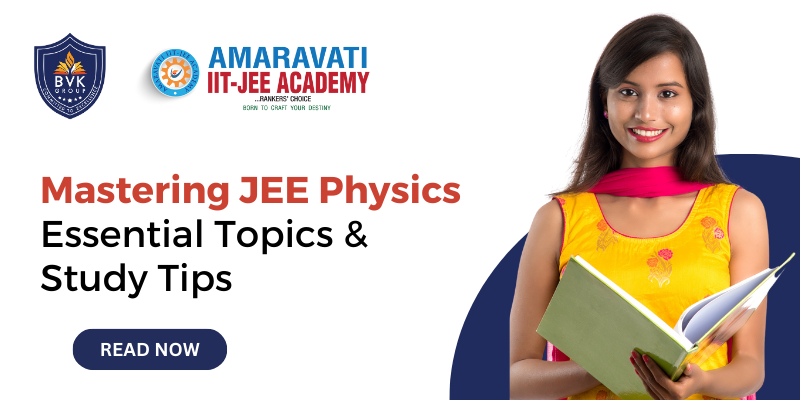
Mastering JEE Physics: Essential Topics and Study Tips
The Joint Entrance Examination (JEE) is one of India’s premier entrance tests. With a vast sea of candidates competing for limited academic seats, excellence in every subject, especially Physics, becomes imperative. This detailed article aims to steer aspirants through the pivotal realms of JEE Physics, highlighting core topics and imparting invaluable study techniques to enhance preparation.
Keen Understanding of Exam Pattern
Before delving into the subject specifics, understanding the exam pattern is crucial. The JEE comprises multiple-choice questions with a twist: single correct options, multiple correct options, integer-type, and comprehension-based questions. Familiarizing yourself with the question types lets you strategize and allocate time wisely during the exam.
Topic-wise Weightage
Knowing the weightage of topics can help students allocate their preparation time efficiently. While every topic is crucial, emphasizing those with a higher weightage can be a game-changer. Historically, Mechanics and Electrodynamics have often had more questions in the JEE. However, don’t skip any topic entirely – JEE has a habit of surprising students!
Essential Topics in JEE Physics
Mechanics: Often considered the backbone of JEE Physics, Mechanics is vast and foundational. It covers Kinematics, Newton’s laws of motion, Work, Energy, and Power. A strong grasp here can help in understanding other topics better.
Electrodynamics: Comprising Electrostatics, Current Electricity, Magnetic Effects of Current, and Electromagnetic Induction, Electrodynamics is crucial. Questions from this segment are often interlinked, making clarity of concepts vital.
Optics: Dive into the behavior and properties of light. The magic of lenses, mirrors, and prisms awaits. Ray and Wave Optics are predominant here.
Modern Physics: An interesting segment, it introduces Quantum Physics, Nuclear Physics, and Atomic Structures. JEE often tests conceptual clarity here, making it essential to understand the underlying principles.
Thermodynamics and Kinetic Theory: This section explores the principles of energy transfer and the kinetic theory of gases. Understand the laws of thermodynamics and how different systems interact regarding energy.
Study Tips Preparation For JEE Advanced
-
Understand Important Concepts
For JEE, don’t just try to remember everything; make sure you really get it. Instead of just learning by heart, know how things work. JEE doesn’t just check if you remember things but if you truly understand them. So, always focus on understanding the “why” and “how” of topics, not just the “what”. This deeper understanding will help you answer tricky questions better.
-
Choose the Right Study Material
Not every book is suitable for everyone. While many students find HC Verma’s Physics book helpful, choosing what works best for you is important. Everyone has a different way of learning, so you should pick books and study materials that you feel comfortable with and that explain things in a way you can easily understand. Always check different options and see which makes difficult topics clearer for you.
-
Get a Grip on the Whole Syllabus
It’s always nice to study the parts you’re good at, but don’t forget the topics you find hard. It’s like playing cricket; you can’t just be good at batting and ignore fielding or bowling. In the same way, for exams, it’s important to give some time to every subject and topic in the syllabus. Even if some parts seem tough, read them at least once. This way, you won’t be surprised or worried if a question from that topic comes in the exam.
-
Prepare Your Own Methods of Learning
Every person learns differently. Some people understand better with pictures or diagrams; others remember things by making rhymes or short phrases. It’s like how some people like spicy food, and others like sweet. So, make your own study tools. You can write notes, draw charts, or even make up little songs about what you’re studying. The important thing is to find what works best for you so that you can remember and understand the subjects better.
-
Make Use of Previous Years’ Question Papers
Using old question papers is very useful. By looking at them, you can understand what questions usually come and which topics are important. It’s like watching old cricket matches to understand how a team plays. Also, when you practice answering these papers, you feel like sitting for the exam. This can help you see how ready you are and where you need to study more. So, always make it a habit to solve previous years’ papers before your exam.
Final Points
Mastering JEE Physics isn’t just about knowing the content; it’s about strategy, understanding, and unwavering dedication. In JEE preparation, it’s vital to note that sheer intelligence doesn’t always guarantee success; the quality and consistency of preparation count. Embracing a disciplined study routine, regular practice, and a genuine curiosity about the subject can turn the aspiration of excelling in the JEE into an achievable goal.
Good luck, future physicist! Your journey towards mastering JEE Physics is both challenging and rewarding. Embrace the process, and success will follow.